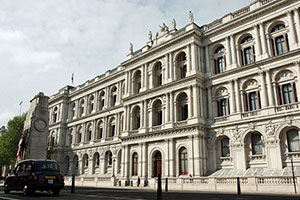Recommended

Blog Post
The UK’s next government—very likely a Keir Starmer-led Labour one—will inherit a development function that is slowly recovering from years of damage. But if they harbour serious intentions to restore and improve on the UK’s role in international development, they will need to consolidate and advance on its nascent recovery.
Since the absorption of the Department for International Development (DFID) into the Foreign and Commonwealth Office, there has been a clear pattern in the fortunes of the development function of the department, every decision taken made the UK’s development function worse: less impactful, less efficient, less accountable and less attractive as a partner for developing countries, other donors countries and multilateral institutions. Then, around 18 months ago, Andrew Mitchell was appointed Minister of State for International Development and Africa. Since then, the trajectory has (shallowly at first, and with gathering pace), reversed. Each decision taken under his leadership has restored something of the purpose and effectiveness of the UK’s development offer.
But it hasn’t returned to where it started. Institutional consolidation and reform remains well short of ideal; and while the poverty focus provided by the new White Paper is a clear advance on the unfocused and poorly articulate approach of the merged department till then, it lacks a reliable mechanism for delivery.
Unless something dramatic happens between now and whenever a general election is held, Labour will have a chance to change this (and if something dramatic does happen, all of the following applies to the Conservatives, too).
Here, I set out five priorities for the next government, which they need to start planning for now. Much of this relates to the minutiae of how government organizes its basic functions, things which rarely get much attention from the outside, but are of fundamental importance to effectiveness and impact. Having spent more than a decade working in government (most of it in DFID), I’ve seen first-hand how and why getting them right matters for the effectiveness of the work it does.
First, and most obviously, is the content. What we’ve heard so far is that poverty and a focus on the poorest countries, and a climate-compatible growth path will be the guiding lights. Lisa Nandy’s recommitment to a poverty focus is great news, and it matches the focus the Conservatives committed to in the recent International Development White Paper. There is time for Labour to think through exactly how this will translate into action,especially because, regardless of any change in focus, a large chunk of the existing Foreign, Commonwealth and Development Office (FCDO) programming would likely be retained in the short and medium term. But, the details underlying this will matter very much. With a smaller budget and less influence (for now), Labour will need to choose exactly what to focus on, and where. Both I and my colleagues will have much more to say about what should be on this agenda, so I will leave it at that for now.
But whatever the content ultimately includes, given the poverty focus all the major parties have committed to, restoring the delivery capability of the development function will determine its success. I have separately, with Rachael Calleja, set out the broad options for the institutional form the development function can take. What follows here is, independent of which form is selected, four reforms required for effective and efficient delivery.
Consolidate and empower the policy function for development
The first is to further consolidate the policy function for development. FCDO pursues multiple priorities across a number of objectives. Development is a subset of these objectives and priorities, but is complex and difficult enough to demand a dedicated policy function. Whatever the government selects as its objectives for development will need to be translated into a specific set of policies to achieve it. Doing so requires expertise: development, aid management and programming and policy influence across both multilateral and developing country governments are specialist skills; policy on them cannot reasonably be designed by generalists without experience of them, though it also needs to be able to draw on a wider range of expertise—from academia, think tanks and the rest of government, given the increasingly complicated challenges developing countries now face. Under Andrew Mitchell, the FCDO has regathered much of the policy function under two directors-general who report to the second Permanent Secretary, Nick Dyer. However the development function is organized institutionally, this needs to be retained, and strengthened. At present, the majority of programming action is still happening under the geographic directors-general. For them, development is one of a number of objectives they pursue, and the link to a clear development policy is weaker. Development policy must sit closer to the programming function, so there is a close read-across between development policy and the activities the development apparatus funds and delivers directly. And it needs to inform the broader international agenda, rather than function as an afterthought within it. The need for a specialist development policy function, sitting close to programming is true regardless of the institutional form selected.
Rebuild development capabilities
Second, a clear approach for rebuilding capacity needs to be adopted. This means retention of the expertise that has not yet been lost and the further recruitment of good people with specific development experience. It is not clear that the FCDO’s existing human resources (HR) model can deliver this. One of the things that made DFID effective (particularly in the first half of its existence) was its ability to recruit experts in various development sub-fields. This was facilitated by its use of a much larger and more differentiated system of technical “cadres” with quality assurance and cadre-specific promotion and recruitment requirements. Whether or not the merged department is retained, an HR platform that recognizes and rewards technical excellence, that recruits not just civil service generalists but development experts, and allows for a clear strategy of rebuilding specific technical capabilities is required. This platform should also allow for the deployment of non-civil servants (for example, in emergency response situations, or for specific technical assistance or similarly time-bound projects or activities) and should be linked to a procurement and project management platform, as set out below.
Reform and strengthen programme management and procurement
Thirdly, an effective procurement and project management platform needs to be established. Running an aid programme without a direct delivery capability requires an extremely strong procurement and contracting function. FCDO (and DFID before it) use multiple kinds of contract, including payment-by-results, and face multiple different principal-agent problems in its contracting and delivery relationships. Strong, specialist contracting and procurement capacity is required. But to get the most from it, it must be paired with extremely strong project management structures. These have atrophied badly in the merged department for three reasons. First is the loss of capacity. Second is that delivery of high-quality programmes is less valued and hence less rewarded. And third is that the lines of accountability for delivery have weakened, of which more below. Getting procurement and programme delivery right are closely related, and problems pre-date the merger. In the later part of DFID’s existence, the same few contractors won a large portion of bids; and more effective, locally-embedded delivery agents were ignored. In part this was because programme managers inside DFID did not have the capacity to manage and monitor multiple delivery agents, so many programmes were delivered by intermediaries: often large management consultancy or accountancy firms, who then subcontracted and provided a single point of contact to programme managers on financial management, accounting and HR matters. But this increased the distance between the policy function and delivery chain. A platform that replicates this function, which could be fully owned by the development department but sit outside it, would allow programme officers (or technical experts with accountability for the programmes) to use a wider range of delivery agents and bring delivery and policy closer again. Both the changes needed for rebuilding capacity and those for procurement and project management will also be critical for effectively implementing localization.
Clarify and tighten lines of accountability
And lastly, tying all of these changes together, a crystal-clear line of accountability for development policy, programming and spending needs to be established. At present, FCDO’s two permanent secretary model does not provide this. Some portion of the development budget reports through the development Permanent Secretary, Nick Dyer. Another portion (managed in-country) runs through Philip Barton. For effective accountability, and to drive management of development work for impact, all of this needs to be formalized in reporting to the development permanent secretary, and to the development minister. This should extend beyond simply covering the aid budget, but also the broader resources (including personnel) allocated to development functions. Beyond this, spending from other government departments follows a different legal basis to FCDO’s and runs through a completely different set of Accounting Officers. Without a single line of accountability linking policy, resources, programme management and impact, it becomes much harder to effectively deliver a development programme. And this line of accountability needs to be formalized. The UK civil service works best when clear objectives, operationalized through policy and programming are delivered in a system with clear and unified accountability for the overall objective.
These delivery priorities are compatible with a range of institutional forms. They can be designed and implemented even within the existing merged department arrangements, though they may follow more naturally from other set ups. Collectively, they will also help restore what was, in my experience, the defining characteristic of UK development policy: the mission-driven commitment of the people and institutions who discharged it. But whatever the next government decides it wants its development policy to achieve, delivering it requires establishing and protecting a much stronger delivery mechanism. The priorities set out here would be a good start.
Disclaimer
CGD blog posts reflect the views of the authors, drawing on prior research and experience in their areas of expertise. CGD is a nonpartisan, independent organization and does not take institutional positions.
Image credit for social media/web: Tomas Marek / Adobe Stock






